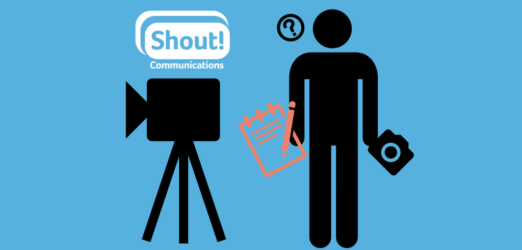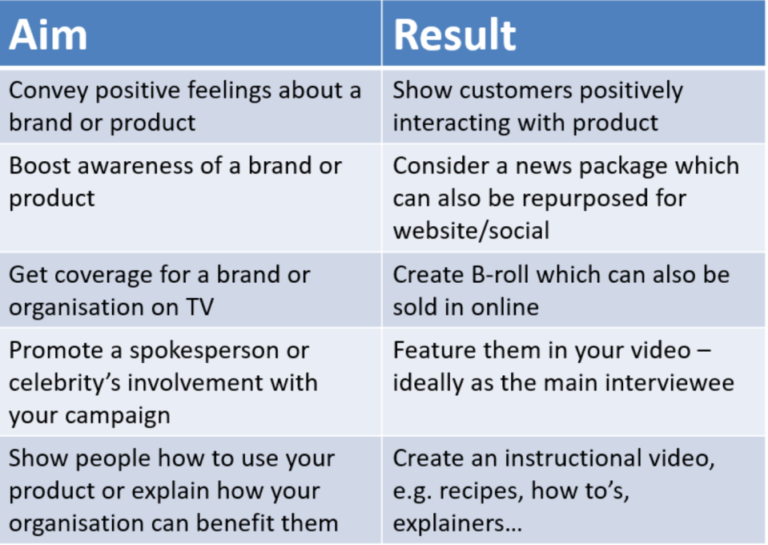Video production is exciting and the temptation when you’re involved is to turn the camera on as quickly as possible, and get filming. But, in our view, that doesn’t necessarily give you the best possible end result. Arguably the most important part of the video production process happens before the cameras start rolling. Get the planning wrong and the whole project can be put at risk.
In this blog, I will be looking at some of the things that need to be looked at in this vital stage.
The most important question we ask our clients is what they want to achieve with the video. To be most effective, video needs to have a purpose; once you know the goal you can cut your cloth accordingly.
As a rough guide the table below works well in demonstrating how different styles of video can suit different needs.
The next thing to think about is the budget. We all want champagne for the price of half a lager and whilst we will always try to squeeze as much value for money out of your budget it’s worth being realistic too! We offer set prices for filming and editing; these are based on time and we take responsibility for telling you how long it will take. So, if the edit turns out to be more complex than anticipated that’s up to us to sort it, the price doesn’t change.
Good filming takes time to do. It’s the attention to detail, making sure the background is appropriate, there is no background unwanted noise, the shots are creative and visually interesting….all these things help make the difference between dull and watchable video.
The main objective has always got to be the creation of video that will engage your intended audience, so you must use your budget appropriately. For example, we recently supported MSD Animal Health with a campaign about dog ticks. These are tiny, little creatures, barely visible to the naked eye, so some of our budget was effectively used in hiring in a macro lens, enabling us to get extreme close up shots of the ticks. These shots of the ticks were vital for the campaign and they were used in B-roll by the BBC, ITV and Sky, a perfect example of budget well spent!
For anything other than B-roll (and if you want to know more about B-roll check out one of our other blogs here) a really important part of pre-production is for us to create a storyboard or detailed shot list. This allows you the client to get a really good sense of what the finished video will look like. We allow two rounds of approvals in the edit, but the storyboard gives you even more control.
If possible, a location recce is also really helpful, especially if we are filming in a new place or if the location has specific requirements. It is all well and good seeing stills of a location, but the last thing you would want is to find that on the day of the shoot there is a construction site next to the location, making it impossible to get decent sound.
In another recent shoot, for The National Lottery, we filmed a PR stunt at The Trafford Centre in Manchester. In the shoot, a helicopter had to land in the car park, so a recce was vital for working out camera positions as well as identifying interesting places to film inside the shopping centre.
One final thing to think about in pre-production is things that would help out in the edit. It is a good idea to provide any assets such as logos, fonts, names of interviewees and calls to action in advance as it will help with the turnaround time. It is also really important to let the video team know what platforms the final video will end up on. On a shoot for Cartoon Network, we were told that some of our content would be repurposed for Instagram. This was very important, as Instagram displays video vertically, not horizontally like most platforms. If we did not know that the videos would be repurposed the framing of the shots would look odd. Therefore, we were able to shoot in a way so that they looked great on every platform!
Hopefully that has given you an idea of how important pre-production is and how decisions that are made early on in the production will make or break a video. If you would like to discuss pre-production (or any other area of production!) give our team a call on 020 7240 7373.




